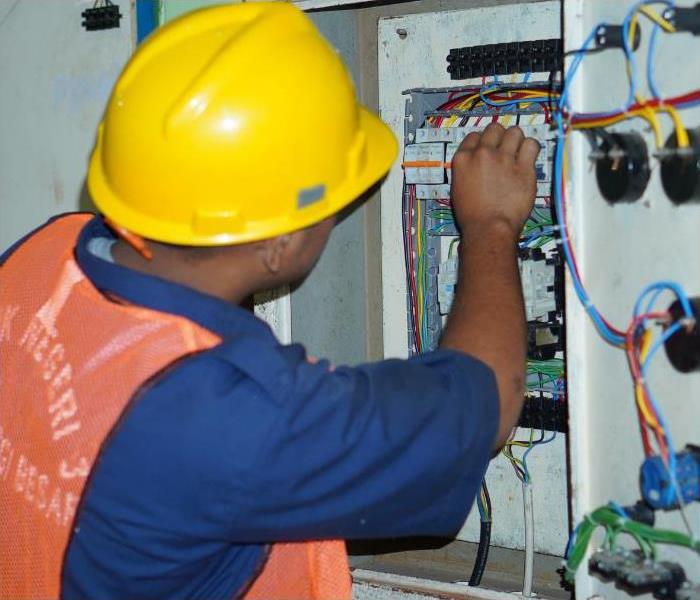Essential Fire Safety Tips for Residential Homes in Layton, UT
7/18/2024 (Permalink)
Fire safety is a critical concern for homeowners in Layton, UT, and across the country. Every year, thousands of homes are damaged or destroyed by fires that could have been prevented with proper precautions. In this comprehensive guide, we'll explore essential fire safety tips tailored specifically for residential homes in Layton, UT. By following these guidelines, you can significantly reduce the risk of fire and protect your home and loved ones.
1. Install and Maintain Smoke Alarms
Smoke alarms are your first line of defense against fires. Install smoke alarms on every level of your home, including inside each bedroom and outside sleeping areas. Test them monthly to ensure they are working properly, and replace batteries at least once a year. In Layton, UT, where winters can be cold, check that smoke alarms are not affected by extreme temperatures or drafts.
2. Have a Fire Escape Plan
Develop a fire escape plan and practice it with your family regularly. Identify at least two ways to escape from every room, especially bedrooms. Choose a meeting place outside the home where everyone will gather after escaping. Make sure that windows and doors can be easily opened from the inside and that security bars have quick-release mechanisms.
3. Keep Fire Extinguishers Handy
Place fire extinguishers in key locations such as the kitchen, garage, and workshop. Ensure that everyone in the household knows how to use them. The acronym PASS is a useful guide: Pull the pin, Aim the nozzle at the base of the fire, Squeeze the handle, and Sweep from side to side.
4. Practice Kitchen Safety
The kitchen is a common area where fires start. Never leave cooking unattended, especially when frying, broiling, or grilling. Keep flammable items like towels, paper towels, and curtains away from cooking appliances. If a grease fire occurs, carefully slide a lid over the pan and turn off the burner. Do not attempt to extinguish a grease fire with water.
5. Maintain Heating Equipment
If you use space heaters, keep them at least three feet away from anything that can burn, such as curtains, bedding, and furniture. Turn off space heaters when leaving the room or going to bed. Ensure that chimneys and vents are cleaned and inspected annually by a professional to prevent chimney fires and carbon monoxide buildup.
6. Practice Electrical Safety
Inspect electrical cords for fraying, damage, or signs of overheating. Avoid overloading outlets and extension cords, and never run cords under rugs or furniture. Consider installing AFCI (Arc-Fault Circuit Interrupter) outlets, which detect and mitigate electrical arcing to reduce the risk of electrical fires.
7. Store Flammable Materials Safely
Keep flammable liquids, such as gasoline, propane, and paint thinner, in tightly sealed containers in a well-ventilated area away from heat sources. Store them outside the home if possible, in a detached garage or shed. Never smoke near flammable materials or use them near open flames or sparks.
8. Install Fire-Resistant Materials
Consider using fire-resistant building materials when renovating or building your home. This includes fire-resistant roofing materials, siding, and insulation. Ensure that attic vents are equipped with spark arrestors to prevent embers from entering and igniting combustible materials.
9. Be Mindful of Smoking Hazards
If you smoke, do so outside and use deep, sturdy ashtrays. Never smoke in bed or when drowsy, and ensure that cigarette butts are fully extinguished before disposal. Consider quitting smoking altogether to eliminate this fire risk.
10. Educate Your Family and Guests
Educate your family members, especially children, about fire safety and the importance of fire prevention measures. Inform guests about your fire escape plan and designated meeting place. Encourage everyone in your household to be vigilant and proactive in fire safety practices.
By implementing these fire safety tips tailored for residential homes in Layton, UT, you can significantly reduce the risk of fire and protect your home and loved ones. Remember, fire safety is a collective responsibility that requires ongoing awareness and proactive measures. Stay informed, stay prepared, and prioritize safety in every aspect of your home life.






 24/7 Emergency Service
24/7 Emergency Service
